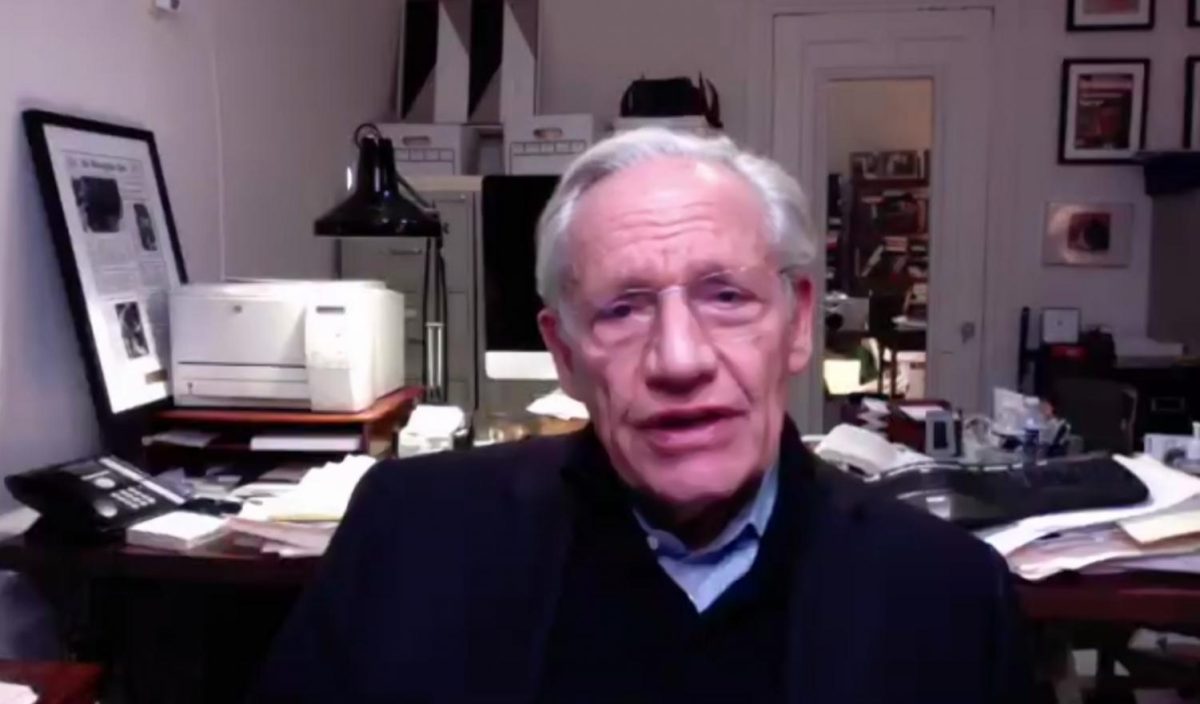Bob Woodward presents how truth plays fundamental role in presidency
Investigative reporter Bob Woodward spoke via Zoom on Monday as part of the Miami University Lecture Series.
February 19, 2021
After covering 10 presidents, investigative journalist Bob Woodward has noticed a common thread connecting them — how truth played a role in the way they governed.
“The real theme is truth, how do we as a country . . . how do politicians . . . particularly presidents, deal with truth,” Woodward said.
Woodward spoke to an Oxford audience Monday, Feb. 15, as part of the Miami University Lecture Series. His presentation, “How We Got Here: The State of the American Presidency,” delivered via Zoom, was viewed by around 500 students, professors, alumni and community members, said Hannah Banas, Lecture Series committee member.
Best known for his reporting in the Watergate scandal that led to the resignation of former President Richard Nixon, Woodward has since written books about nine other presidents, totaling 20% of all American presidents.
There hasn’t been much about presidential truth-telling that Woodward has not witnessed. He’s gone from arranging meetings with anonymous source Deep Throat (later determined to be FBI Associate Director Mark Felt) in an underground parking garage at 3 a.m. while reporting on Watergate, to receiving unexpected phone calls from former President Donald Trump at 10 p.m. on the weekends.
“You go from Nixon to Trump and what an adventure for the American people,” Woodward said. “The theme — failure to tell the truth and understand the truth.”
Woodward’s most recent book, “Rage” about the Trump presidency, includes quotes from nine hours and 42 minutes of interviews with the former president. Woodward said he carried around his Olympus tape recorder at all times because he never knew when Trump would call.
“It was one of the strangest experiences of my reporting life,” Woodward said. “Five minutes with Trump is an adventure, can you imagine nine hours and 42 minutes?”
In an afternoon Zoom session with Miami students prior to the lecture, Woodward said people who do polling have told him the tapes from those interviews cost Trump the election, although this can never be proved. The tapes exposed Trump’s knowledge of the severity of the coronavirus back in January, 2020 and his dismissal of the warnings from medical experts.
Woodward said normally in times of crises, people are brought together, but despite having multiple crises in the country at the moment, the country is seriously divided.
“Seventy-four million people voted for Trump, to be honest with you, I’d like to interview all 74 million of them,” Woodward said.
As far as Trump’s future in the party, Woodward said no one can possibly know. “We’re going to see. There is information out there that Trump has this hammerlock on the party but at the same time, people like Mitch McConnell are saying ‘I’ve had enough’,” he said.
Despite his honesty in reporting that can make officials look bad, most of the time people such as Trump are still willing to talk to Woodward. He said the key to getting people to cooperate with interviews, is to let them have their say, while maintaining your independence.
Age is just a number for 77-year-old Woodward, as he begins writing his 20th book. He is working alongside Washington Post reporter Robert Costa on his next book about Trump’s final days as president and President Joe Biden’s transition to power.
Costa tweeted he is now on book leave.
“I’ll be away from daily print coverage, television, and Twitter for some time,” he said. “All is well, just focused on the book.”
Woodward said that over the years of his journalism career, the media has become more and more prominent. He said the impatience of the people has made media outlets turn complex stories into headlines or phrases.
“As excellent and necessary as (daily journalism) is, it takes a snapshot of life,” Woodward said. “Life is not a snapshot, politics is not a snapshot, and the presidency is not a snapshot.”
On a more personal note, Woodward emphasized the importance of students finding work they love and reminding them if they take a wrong path, they are not alone.
Woodward said he believes being a reporter is the best job anyone can have.
“As a reporter, you can call people up, go see them and make momentary entries into their lives when they’re interesting, and then you get the hell out when they cease to be interesting.”















